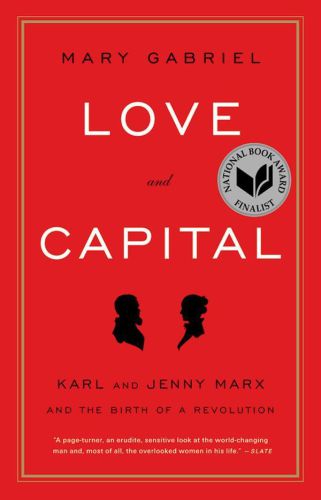
Love and Capital
Karl and Jenny Marx and the Birth of a Revolution
کتاب های مرتبط
- اطلاعات
- نقد و بررسی
- دیدگاه کاربران
نقد و بررسی

Starred review from June 13, 2011
Gabriel (Notorious Victoria) offers a magisterial account of the lives of Karl Marx and his wife, Jenny von Westphalen, remarkable for the ease with which it moves between the domestic and the political spheres, offering a vivid picture of the man who not only gave birth to modern socialism but who was also a loving husband and doting father. Tracing their tumultuous lives from Prussia, via Paris to Brussels and finally London, Gabriel tells the story of a woman who forswore the comforts of her noble upbringing to raise a family in often very straitened circumstances with a man committed in both his life and letters to social justice and the emancipation of the working class. Equally at home with the details of Marxist theory and revolutionary Europe as she is with the private lives of Karl and Jenny, the author dazzles most with her fascinating accounts of the lives of the Marx children. Of seven born to Jenny, only three daughters survived to adulthood and became women immersed in the culture and issues of their times, two becoming prominent social activists in their own right. With a fluid style that belies her considerable research, Gabriel offers us the human, family side of a character more usually seen as a calculating theoretician, and in so doing offers an intimate glimpse into the trials, tribulations, and passions of a man who, more than any other thinker, has shaped our modern notions of work, money, and social relations.

Starred review from June 15, 2011
Former Reuters journalist Gabriel (The Art of Acquiring: A Portrait of Etta and Claribel Cone, 2002, etc.) offers a rich, humanizing portrait of the Marx family.
The author strives mightily—and largely succeeds—in maintaining balance and perspective in her view of Karl and Jenny Marx and their family, long demonized by the Right and sanctified by the Left. Gabriel begins in 1851; the exiled Marxes were in London, enduring penury and near starvation as Karl struggled to do the research and writing that would later culminate in Das Kapital, the multi-volume work completed by his longtime friend, collaborator and patron, Friedrich Engels. Gabriel writes most enthusiastically about Marx's wife, Jenny, a brilliant and lovely woman from a moneyed family who married Marx, uncomplainingly endured their decades of poverty, never lost faith in the significance of her husband and his work, delivered his children (some of whom died in childhood) and lived to see his work begin to achieve the recognition she had always believed it deserved. The author relies heavily on the massive Marx family correspondence to help her bring to life these most remarkable people. The three daughters who survived into adulthood were all highly intelligent, accomplished and unlucky in love. The author can barely restrain her disdain for Edward Aveling, the philandering (married) man who persuaded young Eleanor Marx to live with him, then betrayed and abandoned her. Her suicide followed not long after. Later, her older sister Laura would also took her own life. Gabriel gracefully achieves an impressive, challenging agenda: the joint biographies of the Marxes (parents, daughters), the career of Engels, the rise of socialism and organized labor, the theoretical background of Marxian economics and politics and the historical and economic contexts for all.
A saga as richly realized as a fine Victorian novel.
(COPYRIGHT (2011) KIRKUS REVIEWS/NIELSEN BUSINESS MEDIA, INC. ALL RIGHTS RESERVED.)

August 1, 2011
While a plethora of books on Karl Marx, his works, and Marxism are available, this is the first seriously researched study of the relationship--the passionate love story--between the philosopher and his wife, Jenny von Westphalen. Gabriel (former editor, Reuters News Service; Notorious Victoria: The Life of Victoria Woodhull, Uncensored) draws heavily upon extensive Marx family correspondence to create a compelling story of love and heartbreak, following the Marx family across Europe through hard times and tragedy. She reveals not only the intellectual and revolutionary Karl Marx, but also the husband, father, and very human being. The book also notably portrays his lesser-known wife, a woman of intelligence, beauty, and noble birth who sacrificed dearly for her husband, his ideals, and their seven children. Gabriel continues the family saga after Karl Marx's death to follow the lives of his three surviving daughters, two of whom committed suicide, all the while intricately weaving history, politics, and the birth of socialist thought throughout. VERDICT Recommended for serious general and specialist readers interested in understanding Karl Marx more deeply, the development of Marxist doctrine, and humanized 19th-century European history.--Leslie Lewis, Duquesne Univ. Lib., Pittsburgh
Copyright 2011 Library Journal, LLC Used with permission.

September 1, 2011
Gabriel blends Marx's radical political activities and summaries of his major writings into an unblinking account of his marriage in a book-lengthening strategy that eventuates in much minutiae of socialist history while still showing the causes of the Marxes' chronic marital crisis. The prophet of the proletariat, who never held a job, was a financial incompetent, whose years spent haunting the British Library subjected his aristocratic wife and daughters to penury. The question Gabriel pursues is why they acquiesced. Amid unremitting detail about the family's squalid quarters, pawning of possessions, and repetitive pleas for cash from supporters and relatives, Gabriel accents the affection between parents and children, which Marx nevertheless betrayed by impregnating the family servant. Gabriel also stresses the women's belief in and intellectual and clerical support of Marx's destiny of writing a great expos' of capitalism, despite his inability to finish it. Extending beyond the parents' marriage to the lamentable arcs of the daughters' lives (two were suicides), Gabriel's comprehensive research yields a new standard work about the private Marx.(Reprinted with permission of Booklist, copyright 2011, American Library Association.)

























دیدگاه کاربران